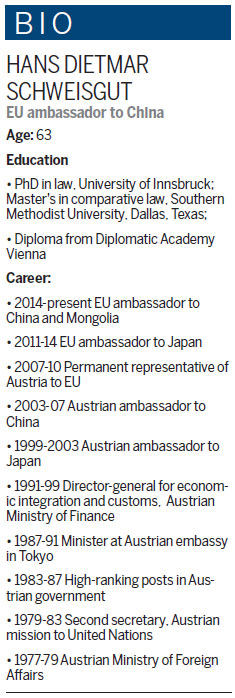Ambassador looks for action on reforms

European Union hopes market barriers are lifted as it aims to expand investments into China
Trade and investment are the cornerstones of the China-European relationship and need to be developed further, says Hans Dietmar Schweisgut, European Union ambassador to China.
Trade between China and the EU has grown rapidly over the past 10 years, a time in which the EU has been China's largest trading partner year after year, Schweisgut says. At the same time the economic relationship has grown in many different areas, he says.

"We are now talking about more than 1 billion euros ($1.2 billion) being traded in both directions every day. But some areas have lagged behind, one being trade in services, which is just a bit over one-tenth of the trading volume of goods, and the other is investment."
The EU is a big investor in China, consistently ranking among the top five, he says. However, the volume of that investment is still relatively small, only about 2 percent of the EU's outward foreign investment. China's investments in Europe, while growing, are also of the same limited order of magnitude as compared to total Chinese outward investment.
"If we compare the relationship between the EU and China with that between the EU and the United States, we can see what a long way we still need to go to make this into a mature relationship, advancing not only trade in goods, but trade in services and also investment. An ambitious bilateral investment agreement would help unlock this enormous potential."
For many years China enjoyed double-digit growth, and now that this has ended, some of the advantages China once had, such as cheap labor, are disappearing, he says.

Firmly implementing reform measures outlined during the Third Plenum of the 18th Central Committee of the Communist Party of China in 2013 will thus become crucial. Such changes should include ensuring that local and foreign companies are treated as equals, removing market barriers and ensuring that intellectual property rights are protected. These issues have gained particular importance as China's economy moves into a new stage, he says.
Implementing the policy will not only settle China's course, but also have a big bearing on the global economy and the economic relationship between China and the EU.
"It is very clear that one year after the reform decisions taken after the third plenum, reform is moving ahead. On the other hand, it is also known that this is not a short-term program, but a longer-term task."
While many reform measures have been taken, many important and difficult decisions lie ahead, he says.
"We welcome all measures which continue to open up and support the dominant role of the market. We see the free trade zones as important pilot projects for such reforms to be implemented throughout China. The true catalyst of investment into China will be linked to countrywide removal of investment restrictions such as the foreign investment guidance catalogue."
If China opened up more, EU companies would be able to pass on their know-how, good management, technology and products, making Chinese companies more competitive, he says. In turn, the EU could also be more open.
At present in the investment field there are still very severe restrictions on foreign companies in a number of areas in China, he says. For example, in many cases joint ventures are required, and technology transfers are obligatory, and he hopes China can push forward on reform to eliminate such restrictions.
Schweisgut says trade and investment are also moving more into technology-intensive areas. "Trade has already moved up into higher value and technology-intensive areas."
For China, Europe is already the largest technology source, but in transferring technology, guarantees of protection are needed, he says.
"High-tech companies want to make sure their IPR rights are protected, their technologies are protected, that their returns are not endangered by unfair and illegal business practices. If this was ensured, high-tech exports would rise further."
Europe is open to commercial investment, especially in high-tech, and giving companies access to research firms, he says.
European high-tech companies are keenly interested to invest in China, he says. If an EU company is treated like a Chinese company, with equal access to research and development funds and equal participation in standardization bodies, it will be able to operate effectively, he says. Chinese companies enjoy this treatment in the EU - and this is what EU companies want in China.
Europe is looking forward to having more Chinese investment, and he is optimistic about the China-EU bilateral investment agreement now being negotiated, and he believes that if an agreement can be reached it will pave the way for more trade and investment.
"China's investment has focused on areas such as infrastructure, utilities and real estate, as well as manufacturing. The European market is open for investment, and we do not specify targets of investment in particular areas. It is more of a market-driven approach."
Schweisgut says he hopes China's urbanization will deliver new opportunities to European companies in China. The country's rapid urbanization is all the more remarkable given China's size, he says. In Europe a similar process took place over several decades.
"If you look at China's urbanization process, I think there is a huge opportunity for sharing the EU's experience. We have the vehicle to deliver such collaboration: the EU-China Sustainable Urbanization Partnership."
Hundreds of millions of Chinese will move from rural to urban areas, and this will have important implications for health, the quality of life and the way society functions.
"It will also have an enormous impact on the environment. We have faced these challenges in the EU, and tested a wide range of approaches to make cities greener, more sustainable, smarter, more mobile - providing citizens with the advanced services and quality of life they deserve."
Apart from business, cultural and people-to-people exchanges are also important, he says.
"We have already moved far beyond just a trade relationship. But I think it is important to say that trade and investment are still the backbone of the relationship, which directly affects our prosperity, and the lives of people.
"There are very few international problems that can be resolved without the participation of China and the EU. ... In many areas they can make a difference by working together, such as on climate change and energy security."
chenyingqun@chinadaily.com.cn
(China Daily European Weekly 01/16/2015 page32)
Today's Top News
- Japan tempting fate if it interferes in the situation of Taiwan Strait
- Stable trade ties benefit China, US
- Experts advocate increasing scope of BRI to include soft power sectors
- New engine powers cargo drone expansion
- China to boost green industry cooperation
- Manufacturing PMI rises in November






























